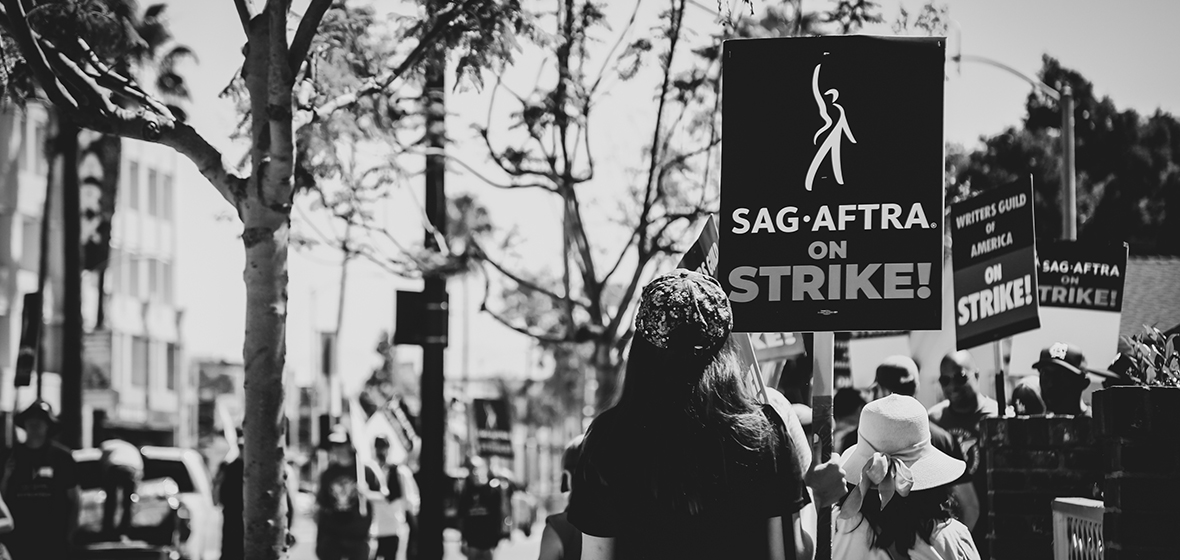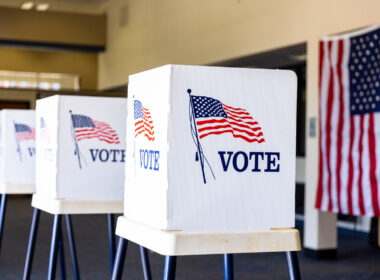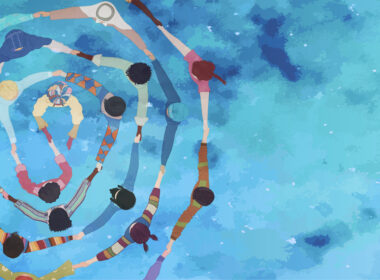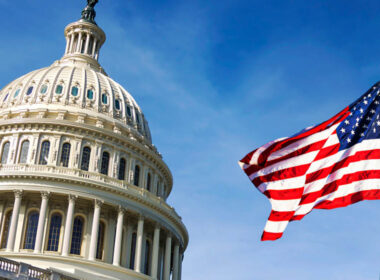The last time the writers’ and screen actors’ unions in Hollywood went on strike at the same time, Ronald Reagan was the President of the Actor’s Guild.
It was the first half of the 1960s, and on the table were the residuals from this new emerging medium taking over people’s media consumption – the television. Studios were licensing their catalogue for broadcast, exploring the fact that old contracts didn’t predict this new form.
For the first half of 1960, writers put down their pens and shelved their typewriters. After the actors joined (their strike only lasted six weeks), film productions shut down, and over 4,000 industry professionals were laid off. Unemployment offices in Los Angeles were overwhelmed while the most famous and affluent actors went on holiday.
The strike achieved its goal, with some concessions: the studios agreed to add television royalties to actors and writers. But there were repercussions.
While productions resumed in just over a month, some were outright cancelled, and many people remained unemployed longer than expected. Actors from the golden era, like Bob Hope and Mickey Rooney, complained the struck deal only benefited new productions. Two months after the strike was called off, Reagan resigned as President of the union – and, in a Hollywood twist, revealed he had invested interest on both sides as a member of the Producer’s union himself.
Since then, every new technological advancement that creates a new medium for media consumption has been followed by a strike to negotiate royalties.
In 1981 it was because of PayTV and home video, and in 2007 productions halted for 14 weeks, affecting not only scripted shows but talk shows and award ceremonies, in a dispute over royalties for “new media” (in this case, streaming over the internet).
Now writers are back on the picket line, and, for the first time in 60 years, they are joined by their fellow actors.
For two months before the publication of this article, productions and pre-productions – anything that includes the services of unionised actors and writers – have halted. For actors, who joined the strike only 11 days ago, this includes promotion and press junkets for their films, leading to curious situations like when the cast and crew of Oppenheimer walked out of the London premiere just as the film was about to start because the guild had called for a strike. Or Disney’s new film, Haunted Mansion, hosted a premiere with Disney characters on the red carpet to replace the cast of the film, Cruella de Vil and Maleficent, instead of Owen Wilson and Tiffany Haddish.
The demands
Subscription-based streaming services are uncharted waters, especially as most of these services are now international instead of localised to the US. Writers want the residuals to reflect foreign membership, rewards for programs with larger viewership, and high-budget programs in ad-supported free subscription services.
Securing most jobs during episodic television production and a new pension and health compensation deal are also demands.
Artificial intelligence (AI) is one of the most contentious issues. Writers ask for regulations on the use of AI, so the technology “can’t write or rewrite literary material; can’t be used as source material; and (materials covered by this Agreement) can’t be used to train AI”. It’s a step to ensure the technology cannot be used to replace writers in content produced by the Alliance of Motion Picture and Television Producers (AMPTP).
Bob Iger, CEO of The Walt Disney Company, voiced his disapproval by calling the strikes “a shame”.
“There’s a level of expectation that they have that is just not realistic,” Iger said to CNBC, “and they are adding to the set of the challenges that this business is already facing that is, quite frankly, very disruptive.”
At the heart of the complaints is precisely the wealth gap between studio executives and the talent creating content. Iger, for example, earns over USD$27 million annually (plus bonuses), while David Zaslav, from Warner Bros. Discovery, netted USD$39 million in 2022. Netflix granted over USD$100 million to its two CEOs (base salary and stock options).
The Screen Actors Guild (SAG-AFTRA) similarly expects an update on the earnings to keep up with inflation, hair and make-up professional for all SAG-AFTRA union members, including background actors, an update of residuals from streaming income, and an improved health and retirement plan.
But again, it’s AI the big issue of disparity. While actors demand “a comprehensive set of provisions to grant informed consent and fair compensation when ‘digital replica’ is made, or our performance is changed using AI”, the studio heads want to scan the image of every background actor and use that individual’s likeness for any purpose without their consent or compensation in perpetuity.
Effectively owning that artist’s likeness so his services are not needed after the original scan.
In a now-viral video, SAG-AFTRA president, Fran Drescher, attacks Hollywood executives and their unwillingness to negotiate with both guilds. “They plead poverty, that they’re losing money left and right when giving hundreds of millions of dollars to their CEOs,” Drescher said. “It is disgusting – shame on them.”
What now?
Since May, writers have not been allowed to work on any project, and since the beginning of July, actors can’t film or promote their films. Several TV shows and film productions have been halted, including a sequel to Ridley Scott’s Gladiator and an upcoming Captain America film. HBO (affiliated with Warner Bros. Discovery) stopped producing forthcoming seasons of their hit shows The Last of Us, Game of Thrones and Euphoria.
Upcoming film festivals and award ceremonies may be cancelled unless actors can attend. Warner Bros. Discovery announced its marque release for the holiday season, Dune 2, which can be delayed to 2024.
For the moment, most of the big releases until the end of the year have finished production. Still, the problem lies in the black hole that stopping for several months can create in the calendar next year. Notoriously, strike action in 1988 saw the premature cancellation of several TV shows, like the successful Moonlighting, while the strike of 07/08 could’ve been responsible for the rise of reality TV as the networks relied on cheap-to-make productions that don’t need writers.
Times have changed, and so have people’s viewing habits. In 2007, audiences were still tuning in to scheduled programs, where reality tv thrives. Now, streaming platforms give us control of what to watch, so it still needs to be determined how audiences will react to the lack of content.
Hollywood productions filming in Australia have also halted, including Apple Never Fall, starring Annette Benning and Sam Neil for Universal, and a new title from the Mortal Kombat franchise. Future productions set to start in the upcoming months have also been put on hold.
In the meantime, the Australian Writers Guild (AWG) and the Media Entertainment Arts Alliance (MEAA) came out in solidarity with their American counterparts and called for any of its members to not work on active projects within the jurisdiction of the WGA or cross picket lines during the strike action.
While negotiations continue, support funds have been created for writers and actors who need them.




